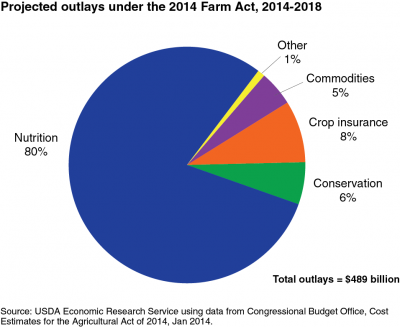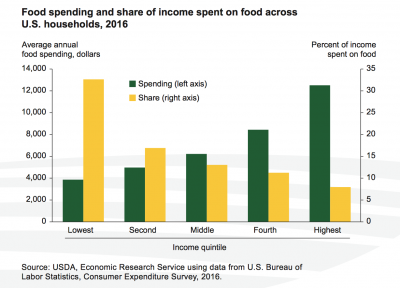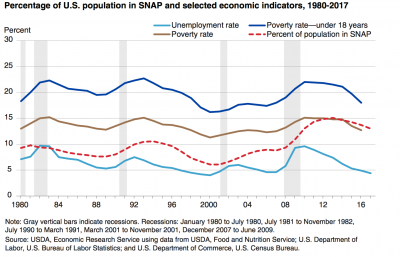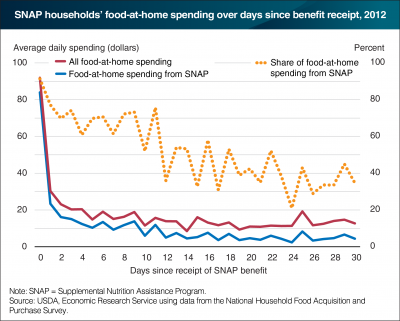The House Agriculture Committee unveiled a draft farm bill Friday that would revamp a key international food aid program, boost risk management options for specialty crop growers and nullify California's…
Farm Bill: SNAP Issues Persist
Kristina Peterson reported on Sunday at The Wall Street Journal Online that, “House Speaker Paul Ryan’s long-sought goal of overhauling welfare programs will get a kick-start when Congress returns to Washington this week, as Republicans prepare to release a new, five-year farm bill that would impose tougher work requirements to get food stamps.
With the government funded until October and control of the House up for grabs in November’s midterm elections, the Republicans’ effort to overhaul the food-stamp program as part of the farm bill is raising what is likely to be one of the last policy fights in Congress this year.
The Journal article noted, “The fight over the farm bill—a piece of legislation with an estimated price tag of about $900 billion that is set to expire at the end of September—has been brewing for weeks. But the outlines of the GOP proposal to rewrite the nutrition provisions that make up about 80% of the bill’s funding have already prompted a partisan standoff in the House Agriculture Committee.”

Ms. Peterson explained, “Under the GOP proposal, able-bodied adults between 18 years old and nearing retirement, without young children, would have to work to be eligible for food stamps, according to lawmakers and aides. If they aren’t working, they would be required to take a minimum of 20 hours a week of new job-training classes, increasing to 25 hours in 2026.
“The program currently has work requirements for most able-bodied people between the ages of 18 and 49, although governors in states with high unemployment can waive those. The current rules contain exemptions, including for those under 18, people with young children, elderly adults and those who are pregnant or disabled. Many of those exemptions are expected to be retained.”

Sunday’s article added, “Democrats have argued that people are unlikely to show up for the job-training classes for the relatively modest amount of food-stamp benefits they would receive and that the work-training programs would create new, expensive bureaucracy.
The clash over the food-stamp provisions has left the committee at a standstill and cast doubt over whether they will be able to pass a new farm bill this year.
Recall that both Ag Committee Chairman Mike Conaway (R., Tex.) and Ranking Member Collin Peterson (D., Minn.) have discussed SNAP related issues in some detail recently (See FarmPolicyNews updates from March 15th, March 27th and March 29th).
House Ag Committee Member Rodney Davis (R, Ill.) also highlighted SNAP in a discussion with Mike Adams late last month on the “Adams on Agriculture” radio program (unofficial transcript here).
In part, Rep. Davis stated that, “And what it is, it’s actually investing more SNAP dollars into workforce development. And I think that’s a good thing. Because frankly, Mike, our goal should be to get people off of SNAP rather than remaining on indefinitely. And I’m glad to fight that fight with the Democrats on the Ag Committee who think that keeping people on SNAP benefits in perpetuity is the way to go for taxpayers and for them.”
SCOOP: The House Ag Committee is slated to mark up the farm bill April 18, according to a GOP aide familiar with the matter. The committee has not yet confirmed.
— Teaganne Finn (@Teaganne_Finn) April 4, 2018
Rep. Davis added, “I would hope that we would break this logjam and that the members of both parties in the House Ag Committee would get back to reality. And let’s work together, because frankly, at a time when we have a lower, historic low unemployment rates and at the same time historic high rates of SNAP usage, that’s not congruent. That should not be happening. We need to do something about it. And investing in those SNAP beneficiaries who need workforce training, spending extra dollars to give them that, that’s the right thing to do, and that’s the American thing to do, too.”

Rep. Davis also indicated that, “Now, our food and nutrition programs, and the folks who implement those programs, are going to do what they can to meet demand. But our goal as policymakers should be to reduce that demand. Nobody is talking about kicking families who need SNAP benefits off of the program at all. We are talking about investing in those families, giving them access to programs, access to community college education opportunities to get trained to get jobs that are available at facilities like Caterpillar in Decatur, Illinois, where I serve.”
Ag Committee Vice-Chairman Glenn “G.T.” Thompson (R., Pa.) spoke on “Adams on Agriculture” last week (unofficial transcript here) and pointed out that, “This is an exciting bill. It doesn’t do things to people, it does things for people in terms of providing them an on ramp to opportunity.”
Rep. Thompson, who is also the Nutrition Subcommittee Chairman, added that, “The only people that would be leaving the program would be those who would self-select not to pursue that opportunity, but they certainly would have the choice to do that.”
Projected #SNAP spending from @USCBO https://t.co/PHACx4CfmI pic.twitter.com/WKp7b3agph
— Farm Policy (@FarmPolicy) April 9, 2018
Also, Tamar Hallerman reported last week at the Atlanta Journal-Constitution Online that, “U.S. Rep. David Scott of Atlanta, the No. 2 Democrat on the committee, co-wrote a letter last month urging the [Ag Committee] panel’s top Democrat to halt negotiations. He said in a recent interview that there was ‘absolutely’ a racial component to the SNAP changes and that the GOP’s proposal was ‘mean-spirited.'”
The AJC article noted, “[Ag Committee Member Austin Scott (R., Ga.)] said such changes are positive ones since they would give families reliant on food stamps more room to get on their feet and eventually graduate from the program.”
And Minneapolis Star Tribune writer Maya Rao reported on Monday that,
As Congress prepares to return from its spring recess, [Rep. Collin Peterson] in an interview questioned whether a new farm bill will even be in place before the old one expires on Sept. 30. ‘Not the way they’re going about it,’ Peterson said of Republicans on the committee.
The Star Tribune article noted, “‘I am disappointed that Collin has led his team to the point of refusing to negotiate,’ [Chairman Mike Conaway] said in a statement to the Star Tribune. ‘Democrats are choosing to turn their backs on rural America in the midst of a 5-year recession in the farm economy. They are refusing to even discuss our proposal to provide a historic investment in opportunities aimed at breaking the endless cycle of poverty for SNAP recipients.'”
“‘There’s a common perception out there that there’s a lot of people drawing government benefits that are able to work that are not working, and I don’t think that’s very widespread,’ Peterson said.”
Lindsey McPerson reported on Monday at Roll Call Online that, “House Minority Leader Nancy Pelosi welcomed her Democratic colleagues back from a two-week spring recess with a ‘Dear Colleague’ letter urging them to oppose several upcoming pieces of legislation.
“Included in Pelosi’s list was the farm bill reauthorizing agriculture programs, which is typically a bipartisan measure. But Republicans this year have been pushing to add work requirements to food stamps, formally known as the Supplemental Nutritional Assistance Program.”
Separately, Wall Street Journal writers Heather Haddon and Jesse Newman reported last week that, “The beleaguered grocery sector faces a new threat: the possible loss of tens of billions of dollars of spending by low-income shoppers.
“The Trump administration is pushing to rein in spending for the food-stamp program by nearly $130 billion over a decade, representing a 20% reduction of its current annual budget of $63 billion. The move could constitute one of the biggest yearly reductions in program-sponsored purchases for retailers since the recession.”
The Journal article pointed out that, “More than 52% of SNAP dollars, or $33 billion, were redeemed at big-box stores such as Walmart Inc. and Target Corp. last year, up from 47% in 2015, U.S. Department of Agriculture data show.”

“Big retailers routinely notice a bump in sales around the time states disperse SNAP money to recipients each month. Kroger Co.’s finance chief, Mike Schlotman, said, ‘We know that we’ll have more people in the store, and they’re likely to be in the store longer.’ A spokeswoman for the grocery chain declined to say how much it collects in food-stamp spending, but said it would push lawmakers to maintain a ‘robust food-assistance program.'”





